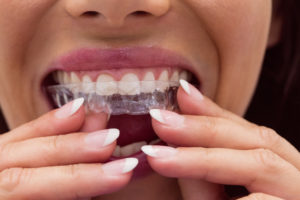07 Mar The 3 Ways that Orthodontics Prevent Your Need for a CPAP Device

Orthodontists are dental specialists in malocclusions, which is a dental term which means problems with how your teeth fit together. If your teeth don’t fit together correctly, it can cause health problems.
Often, orthodontic issues like jaw problems, dental arch issues, or tooth misalignments can cause obstructive sleep apnea (OSA), which is a treatable condition. Orthodontists diagnose and treat sleep apnea, and they can even prevent patients’ need for CPAP devices.
1. Sleep Apnea and Misaligned Teeth
If you have crooked teeth, this could be the root of your sleep apnea problem. Aligners and braces straighten crooked teeth while at the same time addressing sleep apnea. Orthodontists use these devices to unblock patients’ airways.
Additionally, it’s possible to reduce your risk of sleep apnea by treating your misaligned teeth with custom-made devices. By addressing your sleep apnea, you will be less susceptible to health issues like diabetes and heart disease.
2. Sleep Apnea and Lack of Space
When treating children with OSA, orthodontists can use palate expanders to tackle the problem. These expanders are attached to a patient’s upper molar using cemented bonds and bands. These bridges span the top part of the jaw, thereby widening the upper jaw space by linking an expander to the palate.
3. OSA and Your Airway
Another way orthodontics can help with OSA is by changing your jaw alignment while sleeping using a mandibular advancement brace. Orthodontists can install devices such as a MAD (Mandibular Advancement Device) or a MAS (Mandibular Advancement Splint) to help move your tongue and jaw forward.
Widening your airway by moving your lower jaw upward and forward helps reduce your obstructive sleep apnea symptoms. The use of brace-like devices is proven to expand your airway and help with OSA as well.
Final Words
Orthodontists can detect the symptoms of obstructive sleep apnea in adults and children before anyone else. When we find cases of obstructive sleep apnea we know are related to orthodontic issues, we can provide treatment options to patients of all ages.
Braces and other orthodontics can help reduce sleep apnea symptoms. Feel free to contact our orthodontics specialists at our Mansfield, TX, office today to determine the best solutions for your obstructive sleep apnea!
Image: Freepik
